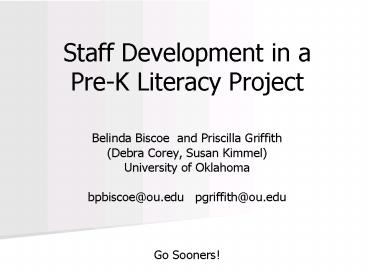Staff Development in a PreK Literacy Project - PowerPoint PPT Presentation
1 / 28
Title:
Staff Development in a PreK Literacy Project
Description:
Staff Development in a. Pre-K Literacy Project. Belinda Biscoe and Priscilla Griffith ... Prepare young children to enter kindergarten with necessary skills to ... – PowerPoint PPT presentation
Number of Views:67
Avg rating:3.0/5.0
Title: Staff Development in a PreK Literacy Project
1
Staff Development in a Pre-K Literacy Project
- Belinda Biscoe and Priscilla Griffith
- (Debra Corey, Susan Kimmel)
- University of Oklahoma
- bpbiscoe_at_ou.edu pgriffith_at_ou.edu
- Go Sooners!
2
United States Department of Education Early
Literacy First Grant
- Focus Pre-K 3 and 4 year olds
- Purpose
- Create early childhood centers of excellence
- Prepare young children to enter kindergarten with
necessary skills to ensure school success
3
GOALS
- Create language and literacy rich classroom
environments - Integrate curriculum, activities and materials
into classrooms and family literacy practices - Assess literacy learning
- Build partnerships to support the transition of
all children into formal classroom instruction - Support family literacy
- Provide research-based sustained professional
development
4
COMPONENTS
- Professional Development
- Instruction
- Child Assessment/Progress Monitoring
- Literacy Mentors
- Assessment Coordinator (Year 3)
- Family Literacy Component
- Family Literacy Nights
- Family Literacy Resources
- Home Visits
- Project Evaluation
5
Project Development
- Year One
- Physical transformation of classrooms
- Initiate literacy classes
- Learn to mentor
- Year Two
- Implement spiral curriculum of literacy classes
- Learn to develop portfolios
- Year Three
- Focus on examining student work to plan
instruction
6
Three Cs of Professional Development
- Community
- Professional development classes
- Examine student learning
- Curriculum Content Assessment and Instruction of
Oklahoma ERF Benchmarks - Oral language
- Phonological awareness
- Print concepts
- Alphabet knowledge and writing
- Listening comprehension
- Coaching
- Implementing instructional strategies
7
Structure of Professional Development Classes
- Two groups certified and non-certified teachers
- Classes off campus
- Classes two times each month for 3 hours
- Literacy instructor
- Literacy mentors attend
8
Content of Professional Development Classes
- Portfolios and Assessment
- Observations and Anecdotal Notes
- Oklahoma PRIDE Literacy Benchmarks
- Oral Language
- Phonological Awareness
- Environment/Classroom Management
- At-Risk Child Language Development
- Alphabet Knowledge
- Comprehension
- Concepts of Print
- Teacher-Child Interactions
- Home Visits
- Family Literacy Nights
- Doors to Discovery Curriculum
9
The Continuous, Recursive, and Interactive
Process of Progress Monitoring
10
Oklahoma P.R.I.D.E. Progress-Monitoring Plan
11
Project Evaluation
- Classrooms
- Before and after photos
- Teachers
- Concept Maps
- ELLCO Early Language and Literacy Classroom
Observation - Focus Groups
- Students
- PALS Phonological Assessment Literacy Screening
12
Changing the Physical Environment
13
- Transforming a disorganized environment
14
(No Transcript)
15
- Setting up Centers
- Dramatic Play
- Writing
- Library
16
Concept Maps
Early Literacy
17
Concept Maps
- Voltz, 2004 (Action in Teacher Education, v. 27
3) - Rated maps for variation and quantity
- Variation number of categories represented in
the map - Quantity total number of ideas
18
(No Transcript)
19
(No Transcript)
20
Early Language and Literacy Classroom Observation
- Literacy Environment Checklist
- Book Use and Availability - 20 points
- Writing Materials and Display 21 points
- Classroom Observation Protocol
- General Classroom Environment 30 points
- Language and Literacy Curriculum 40 points
- Literacy Activity Rating Scale
- Book reading 8 points
- Writing 5 points
21
ELLCO
22
Focus Groups
- Accomplishments Year 2
- Professional growth
- Focus of the program on their roles as
professionals before the program Pre-K teachers
were considered by some to be babysitters but
now they were using research-based teaching
principles that can be measured and validated - Provided roadmap for meeting state standards
23
- Accomplishments Year 3
- Increased familiarity with the curriculum
enhanced implementation of the program because
teachers are now comfortable using the curriculum
and modifying it to suit their classroom needs. - Increased knowledge of literacy principles and
application. - Teaching methods have been strengthened, and the
program curriculum provided a wonderful
foundation to build upon. - Family Literacy Night was an important component
of the program. It was an avenue for reaching
families.
24
- Benefits
- Access to resources/research-based,
developmentally appropriate instructional
strategies - Mentor support
- Professional development classes
- Progress of children
- Credit towards CDA
- Interact with other teachers
- Peer support
- Opportunity to attend professional conferences
25
- Challenges/Concerns
- Letting go of old curriculum and ways
- Over-emphasizing literacy
- Leaving their assistant alone with their class in
order to attend professional development classes - Having resources to sustain parent activity
component after the ERF grant ends - More modeling of different types of classroom
instruction by their mentor
26
PALS/AMIGOS
- Rhyme Awareness
- Beginning Sound
- Upper-Case Alphabet
- Lower-Case Alphabet
- Verbal memory
- Print Knowledge
- Concept of Word
- Name Writing
27
Child Data Outcomes
- Cohort 2
- (Year 2 of the Project)
- Significant differences between treatment and
comparison - Rhyme Awareness
- Cohort 3
- (Year 3 of the Project)
- Significant differences between treatment and
comparison - Rhyme Awareness
- Beginning Sounds
- Upper-Case Alphabet
- Lower-Case Alphabet
28
What Have We Learned
- Childcare research is very messy.
- It has taken three years to see differences in
child outcomes. - Mentoring has to be learned.
- Early childhood educators with a strong literacy
background are difficult to find. - There is a tension among early childhood and
literacy educators over DAP and purposeful
instruction.































